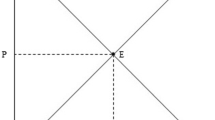Abstract
The economic analysis of the piracy of copyright products has used a variety of modeling assumptions, the majority of which use typical industrial organization settings. The results of such models are manyfold, but in general they are ambiguous as to the optimal protection strategy, and the effects of protection on the welfare of copyright holders, and on the existence of piracy. Concretely, little has been said about which types of protection mechanisms are most adequate for controlling piracy. In the present paper, we propose a new theoretical framework by drawing an analogy between copyright piracy and prey–predator behavior. This analogy gives us a new perspective to approach copyright issues and it provides the economic theory of copyright piracy with a new set of mathematical models. We consider a very simple model that can be used to show that publicly instigated and financed policies designed to deter piracy can have the effect of increasing the amount of piracy, while privately financed strategies (e.g. DRM) will always decrease piracy.
Similar content being viewed by others
References
Banerjee D. (2006) Enforcement sharing and commercial piracy. Review of Economic Research on Copyright Issues 3(1): 83–97
Belleflamme P. (2002) Pricing information goods in the presence of copying. In: Gordon W., Watt R. (eds) The economics of copyright: Developments in research and analysis. Edward Elgar, Cheltenham and Northampton, pp 26–54
Eichner T., Pethig R. (2006) An analytical foundation of the ratio-dependent predator-prey model. Journal of Bioeconomics 8(2): 121–132
Gayer A., Shy O. (2005) Copyright enforcement in the digital era. CESifo Economic Studies 51(2–3): 477–489
Goodwin, R. M. (1967). A growth cycle. In C. H. Feinstein (Ed.), Socialism, capitalism and economic growth (pp. 54–58). Cambridge: Cambridge University Press. Reprinted in Goodwin, R. M. (1982). Essays in economic dynamics (pp. 165–170). London: Macmillan.
Harbaugh, R., & Khemka, R. (2001). Does copyright enforcement encourage piracy? Claremont Colleges Working Paper 2001-14.
Hofbauer J., Sigmund K. (1998) Evolutionary games and population dynamics. Cambridge University Press, Cambridge
Hui, K., & Png, I. (2003). Piracy and the legitimate demand for recorded music. Contributions to Economic Analysis and Policy, 2(1), article 11.
Liebowitz S. (2006) File sharing: Creative destruction or just plain destruction? Journal of Law and Economics 49: 1–28
Liebowitz, S. (2008). Is the copyright monopoly a best selling fiction? Social Science Research Network, Working Paper Series.
Liebowtiz S., Watt R. (2006) How best to ensure remuneration for creators in the market for music?, Copyright and its alternatives. Journal of Economic Surveys 20(4): 513–545
Murray, J. D. (2002–2003). Mathematical biology (Vols. 1–2). Amsterdam: Springer Verlag.
Peitz M., Waelbroeck P. (2004) The effect of internet piracy on music sales: Cross section evidence. Review of Economic Research on Copyright Issues 1(2): 71–79
Shy O., Thisse J. F. (1999) A strategic approach to software protection. Journal of Economics and Management Strategy 8: 163–190
Smith J. M. (1976) Models in ecology. Cambridge University Press, Cambridge
Watt R. (2000) Copyright and economic theory: Friends or foes? Edward Elgar, Cheltenham and Northampton
Zentner A. (2006) Measuring the effect of music downloads on music purchases. Journal of Law and Economics 49: 63–90
Author information
Authors and Affiliations
Corresponding author
Rights and permissions
About this article
Cite this article
Vázquez, F.J., Watt, R. Copyright piracy as prey–predator behavior. J Bioecon 13, 31–43 (2011). https://doi.org/10.1007/s10818-010-9098-1
Published:
Issue Date:
DOI: https://doi.org/10.1007/s10818-010-9098-1




